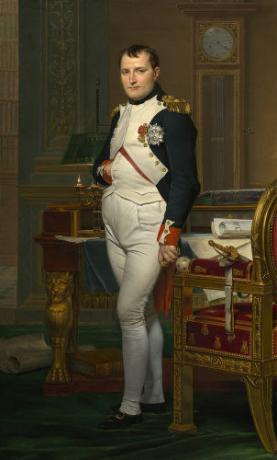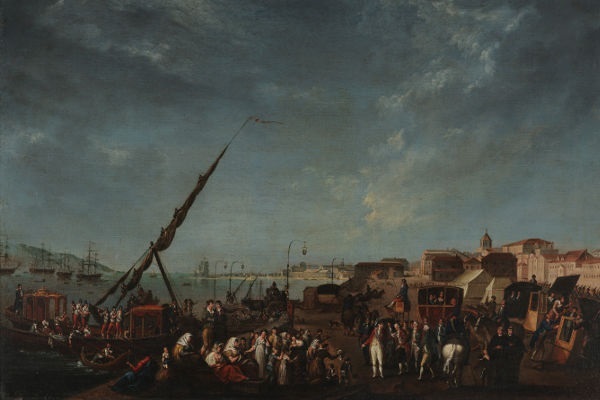THE coming of the royal family to Brazil occurred in the passage from 1807 to 1808 and was the result of the war waged between France and the United Kingdom during the Napoleonic period. The transfer of the court occurred due to Portugal's refusal to obey France's orders and adhere to the Continental Lock, instituted with the aim of harming the English, in 1806.
With this, the Regent of Portugal, d. John, son of d. Maria I, decided to transfer the entire court to Brazil. Thus, the Portuguese power installed itself in Rio de Janeiro, resulting in transformations that had a fundamental influence in triggering the process of independence of Brazil, some years later.
Accessalso: Details about the relationship of d. João VI and his wife, Carlota Joaquina
Context of the coming of the royal family to Brazil

The transfer of the Portuguese court to Brazil is directly related to the events of the
French Revolution It's from Napoleonic period. Since the beginning of the revolution, the existence of absolutist regimes in Europe was severely threatened. After 10 years of the uprising, Napoleon Bonaparte emerged as ruler of France.The events of the revolution severely reinforced the rivalry between France and England in Europe, and this was directly reflected in Portugal's relationship with these two countries. Internally, a very large division installed in Portugal, some defending the country's approach to France, and others defending the good relationship, established centuries ago, with the United Kingdom.
see more: Fall of the Battle - the trigger for the revolution in France, at the end of the 18th century
Portugal, still in the revolutionary period, signed a military protection agreement with the British, but still sought to publicly maintain a positionneutral, so as not to displease any of the nations. As the tension grew, what d. As a precautionary measure, João reinforced the country's defenses on the border with Spain, between 1804 and 1807, according to historians Lilia Schwarcz and Heloísa Starling|1|.
The rise of Napoleon Bonaparte only contributed to the worsening of the situation, as the expansionist impetus and the desire to reformulate the general's European map reinforced the continent's polarization. The regent, d. John (who just became d. John VI in 1816), as mentioned, was constantly pressured by French and English supporters to take sides.
The reason for the royal family to come to Brazil
From 1804, Napoleon “self-crowned” French Emperor, which reinforced his power and increased tension in Europe. Before that, the situation was already apprehensive for Portugal, since the Spaniards had allied with the French, which represented a great threat to the sovereignty of Portuguese territory. In 1801, a small war between Portugal and Spain, the War of Oranges, happened and made Portugal lose the city of Olivença to Spain.
In this defeat, the Portuguese were still forced to accept the following term from the French: to close their country's ports to English vessels. The term was accepted but not put into practice. Unable to invade England, Napoleon decided, from 1806 onwards, to establish the Continental Lock, which determined that the ports of European nations would be strictly closed to British vessels.
With the blockade, the Portuguese began to air the proposal of moving to Brazil in order to escape Napoleon's reach. Portugal refused to join the blockade because relations with the English were good and had been standing for centuries. The situation lasted until mid-1807, when Napoleon issued an ultimatum.
O Napoleon's ultimatum determined that Portugal should, by September 1st, carry out the following measures: summon its ambassador who was in London; expel the English ambassador from Lisbon; closing ports to British ships; arrest the English in Portugal and confiscate their property; and declare war on England|2|.
Weeks of negotiations between Portugal and France and Portugal and the United Kingdom followed, but no understanding was reached. The British advised that if the Portuguese fully accepted the French terms, the two countries would go to war; on the other hand, the French demanded the full acceptance of its terms, otherwise, they would invade Portuguese territory, dividing it with Spain.
As there was no solution, Napoleon ordered the sending of troops to invade Portugal. On November 24, d. João informed that the French troops would arrive in Lisbon within four days and authorized the beginning of preparations for a trip to Brazil. The Portuguese court had the commitment of the British to be escorted safely to Brazil.
Portuguese court trip

O boarding from the portuguese court happened between days November 25th and 27th, 1807. In the midst of preparations, the Portuguese government carried out the transfer of the institutions that administered the country, therefore, it was a very large mission for so few days. In this transfer, all people who had any role in the government moved to Rio de Janeiro with their families.
The Portuguese ships that transferred the court gathered from 10 thousand to 15 thousand people, according to surveys made by different historians. Lilia Schwarcz and Heloísa Starling give the real dimension of what this visit to Brazil was like: “they were not isolated individuals who fled in a hurry, but the headquarters of the Portuguese state that changed its address, with its administrative and bureaucratic apparatus, its treasury, its departments, secretariats, courts, archives and employees”|3|.
The regent of Portugal authorized all his subjects to move to Brazil if they wished, but if there was no space on the court's vessels, they should find their own ways to come to the Brazil. All preparations for the move were carried out hurriedly, so there was run and panic. Much that should have been shipped was left behind, and the ships, crammed with people, did not have enough supplies to go around.
The Portuguese vessels began the trip to Brazil on November 29, 1807, and, on the high seas, they met the four English vessels, which escorted them to Brazil. It is believed that the vessels that came to our country bringing the court were about 15 (there is a mismatch in the information). At the end of the 29th, the French troops entered Lisbon and were formed by about six thousand soldiers.
The problems on the trip were many. The aforementioned overcrowding caused food and water were rationed; there were no dorms or beds for everyone, and hygiene problems were many. These resulted in a lice outbreak who forced women to shave their hair.
know more: Five fun facts about the independence of Brazil
Joanine Period
![The Regent of Portugal, d. João was the one who ordered the arrival of the Portuguese court to Brazil. [1]](/f/93ea669dd2a68d2573ad1eddee9062a9.jpg)
The voyage of the Portuguese court lasted 54 days, and on January 22, 1808, the vessel of d. John arrived in Salvador. From the former capital of Brazil, d. João has already taken the first step that would change the course of Brazilian history: he decreed the opening of ports to friendly nations, on January 28th.
After a brief stay in Salvador, d. João went to Rio de Janeiro, arriving there on March 8th. The other ships arrived in the following days (a storm had separated them). THE arrival of the court in Brazil inaugurated the Joanine Period, during which d. João was in Brazil. The opening of the ports was just the first of several measures taken by the Portuguese ruler and that radically changed Brazilian history.
Grades
|1| SCHWARCZ, Lilia Moritz and STARLING, Heloísa Murgel. Brazil: a biography. São Paulo: Companhia das Letras, 2015. P. 154.
|2| Idem, p. 157.
|3| Idem, p. 163.
Image credits
[1]StockPhotosArt and Shutterstock
By Daniel Neves
History teacher
Source: Brazil School - https://brasilescola.uol.com.br/historiab/corte-portuguesa.htm
